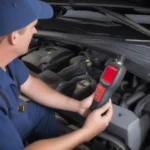Ever hit the open road, feeling excited for a long drive, only to find your car shaking like a dog trying to catch its tail when you reach 60 mph? It’s not a pleasant experience, and it can be a little concerning. Don’t worry, you’re not alone. Many drivers have encountered this car shaking phenomenon at high speeds.
This article will dive into the reasons why your car might be shaking at 60 mph, giving you insights into potential causes and solutions. We’ll break it down step by step, ensuring you understand what’s going on and how to tackle the issue.
Understanding the Issue: Why Does My Car Shake at 60 mph?
Let’s start by understanding why your car might shake at 60 mph. From a mechanic’s perspective, this is often a symptom of a problem with the car’s suspension, tires, wheels, or engine. It can also be an indication of a deeper, more serious problem, which is why it’s always a good idea to get it checked out by a professional.
Think about it this way: Imagine driving a car with a flat tire – it’s going to shake and wobble, right? The same principle applies to other components like the suspension, wheel bearings, or even the engine.
What are the most common causes of car shaking at 60 mph?
1. Wheel Imbalance
Think about a spinning top – it spins smoothly when balanced but wobbles when off-balance. Similarly, if your car’s wheels are out of balance, they can cause vibrations that you feel in the steering wheel, especially at higher speeds.
2. Worn Out Tires
Have you ever noticed how old tires can become cracked and uneven? That’s wear and tear, and it can lead to a shaky ride. Uneven wear can create vibrations that are noticeable at high speeds.
3. Uneven Tire Pressure
Remember that all tires have the recommended tire pressure listed on the driver’s side doorjamb, sticker on the glove compartment, and also in the owner’s manual. If one or more of your tires are underinflated or overinflated, it can create vibrations that are felt in the steering wheel and throughout the vehicle.
4. Worn Suspension Components
Worn shocks, struts, or other suspension components can cause your car to shake at 60 mph. This is because these components are responsible for absorbing bumps and shocks from the road. When they wear out, they are no longer able to properly dampen vibrations.
5. Engine Problems
While less common, engine problems can also cause your car to shake at high speeds. This is because the engine’s power output can be affected by issues such as a misfire, a bad spark plug, or worn engine mounts.
6. Loose or Damaged Wheel Bearings
Wheel bearings are important for supporting the weight of your car and allowing the wheels to rotate smoothly. If they become worn, damaged, or loose, they can cause shaking, grinding noises, or even a complete wheel lockup.
What to Do If Your Car Shakes at 60 mph:
1. Check Your Tires: First, inspect your tires for any obvious problems like uneven wear or cuts.
2. Check Tire Pressure: Make sure all your tires are inflated to the correct pressure. Use a tire pressure gauge to check, and refer to the sticker on your driver’s side doorjamb or your owner’s manual for the recommended tire pressure.
3. Get a Wheel Alignment: An alignment ensures your wheels are pointed in the right direction. This can help prevent vibrations and improve tire wear.
4. Have Your Wheels Balanced: A tire shop can balance your wheels to ensure they spin evenly.
5. Get a Suspension Check: Take your car to a mechanic to have the suspension checked for worn or damaged components.
Frequently Asked Questions:
Q: Can a bad brake rotor cause a car to shake?
A: Yes, a warped brake rotor can cause a car to shake, especially when braking. If you notice a shaking sensation when braking, you should have your brake rotors inspected and possibly replaced.
Q: My car only shakes at certain speeds, why?
A: That’s a good point! It’s possible that a particular speed coincides with a specific vibration frequency that is amplified by a specific problem. For instance, a wheel imbalance might be more noticeable at a particular speed, while a worn engine mount might cause shaking at different speeds.
Q: How can I tell if it’s a suspension issue?
A: If you notice a bouncing or swaying motion when you go over bumps, or you hear clunking sounds when you drive over potholes, you might have a suspension problem.
Q: My car shakes more when I brake, what does that mean?
A: It could be due to warped brake rotors, worn brake pads, or uneven brake pad wear.
Related Articles:
- Why does my car wobble? (https://diagxcar.com/why-does-my-car-wobble/)
- My car vibrates when driving slow (https://diagxcar.com/car-vibrates-when-driving-slow/)
- Why does my car shake when I turn it off? (https://diagxcar.com/why-does-my-car-shake-when-i-turn-it-off/)
- Why does my car vibrate at 60 mph? (https://diagxcar.com/why-does-my-car-vibrate-at-60-mph/)
- My car shakes when driving, what’s wrong? (https://diagxcar.com/why-is-my-car-shaking-when-i-drive/)
Need Help with Diagnostics?
If you’re still unsure about what’s causing your car to shake, or you need help with diagnostics, don’t hesitate to contact us. Our team of expert mechanics is available 24/7 to help you diagnose and fix your car problem. Contact us via WhatsApp: +84767531508.
Conclusion:
Car shaking at high speeds can be a symptom of a variety of problems. By understanding the potential causes and taking the necessary steps to diagnose and address the issue, you can ensure a smooth and safe ride. Remember, if you’re unsure about what’s going on, it’s always best to consult a professional mechanic.
If you found this article helpful, share it with your friends and family. And don’t forget to leave a comment below and let us know what you think!


